Robotic Process Automation RPA Provider Financial Model

5-Year Financial Projections
100% Editable
Investor-Approved Valuation Models
MAC/PC Compatible, Fully Unlocked
No Accounting Knowledge Needed
Robotic Process Automation RPA Provider Financial Model
Bundle Includes:
-
Financial Model
-
Business Plan
-
Pitch Deck
-
Financial Dashboard
ALL IN ONE MEGA PACK - CONSIST OF:
Robotic Process Automation RPA Provider Financial Model/Business Plan Excel Template
Pitch Deck Template For PowerPoint, Keynote & Google Slides
Business Plan Guide and Business Plan Template in MS Word Format
Financial Dashboard in Excel To Track Your Business Performance
ROBOTIC PROCESS AUTOMATION RPA PROVIDER FINANCIAL MODEL FOR STARTUP INFO
Highlights
This comprehensive 5-year robotic process automation (RPA) provider financial model offers a robust financial plan tailored for business planning, including forecasted income statements, financial statements, and key financial ratios in both GAAP and IFRS formats. Designed to facilitate a detailed cost-benefit analysis of RPA implementation, it enables users to evaluate the financial impact of robotic automation on provider profit margins and revenue streams. The model supports financial planning for RPA projects by incorporating robotic automation cost analysis, financial projections for RPA services, and an RPA provider revenue model that highlights critical financial metrics and KPIs. Fully unlocked and editable, this tool provides a dynamic platform for assessing the financial valuation of RPA companies and optimizing robotic process automation ROI models before any business transaction.
This ready-made financial model template for robotic process automation (RPA) providers serves as an essential pain reliever by simplifying the complex financial planning and analysis processes that often challenge RPA service buyers, with automated integration of key components such as robotic automation cost analysis, RPA investment financial forecast, and revenue model breakdowns. By offering comprehensive financial projections for RPA services, including detailed expense modeling, pricing strategy, and profit margin analysis, the model facilitates accurate financial planning for RPA projects and supports robust RPA business case financials. It alleviates the burden of manual data consolidation with connected statements—covering income statements, cash flow, balance sheets, and valuation—that help users generate insightful financial scenarios for RPA deployment, perform cost-benefit analysis of RPA, and track vital RPA financial metrics and KPIs, ultimately enhancing decision-making with a clear, visual representation of robotic process automation ROI models and provider revenue streams.
Description
This comprehensive financial model for robotic process automation (RPA) providers offers a detailed 5-year forecast encompassing projected income statements, balance sheets, and cash flow templates to support financial planning for RPA projects. Designed for both startups and established firms, it integrates industry-specific revenue models and pricing strategies, enabling precise robotic automation cost analysis and financial impact assessments. The model incorporates essential RPA financial metrics and KPIs to evaluate RPA provider profit margins, streamline robotic process automation budgeting, and perform cost-benefit analysis of RPA implementation. By delivering robust financial projections for RPA services alongside scenarios for deployment and investment financial forecasts, this model empowers users to build a strong RPA business case financials and optimize robotic process automation ROI models, ultimately enhancing the financial valuation of RPA companies and supporting informed decision-making for sustainable growth.
ROBOTIC PROCESS AUTOMATION RPA PROVIDER FINANCIAL MODEL FINANCIAL MODEL REPORTS
All in One Place
Elevate your financial planning for RPA projects with our dynamic projected cash flow statement template in Excel. Designed for robust 3-statement modeling, it seamlessly integrates all your assumptions and adapts to diverse financial scenarios for RPA deployment. Thoroughly tested for scalability, this template supports your robotic process automation budgeting and cost-benefit analysis with precision. Recognizing every business’s unique RPA investment financial forecast needs, our flexible financial model for RPA implementation allows tailored adjustments, empowering you to optimize financial projections for RPA services and maximize ROI.
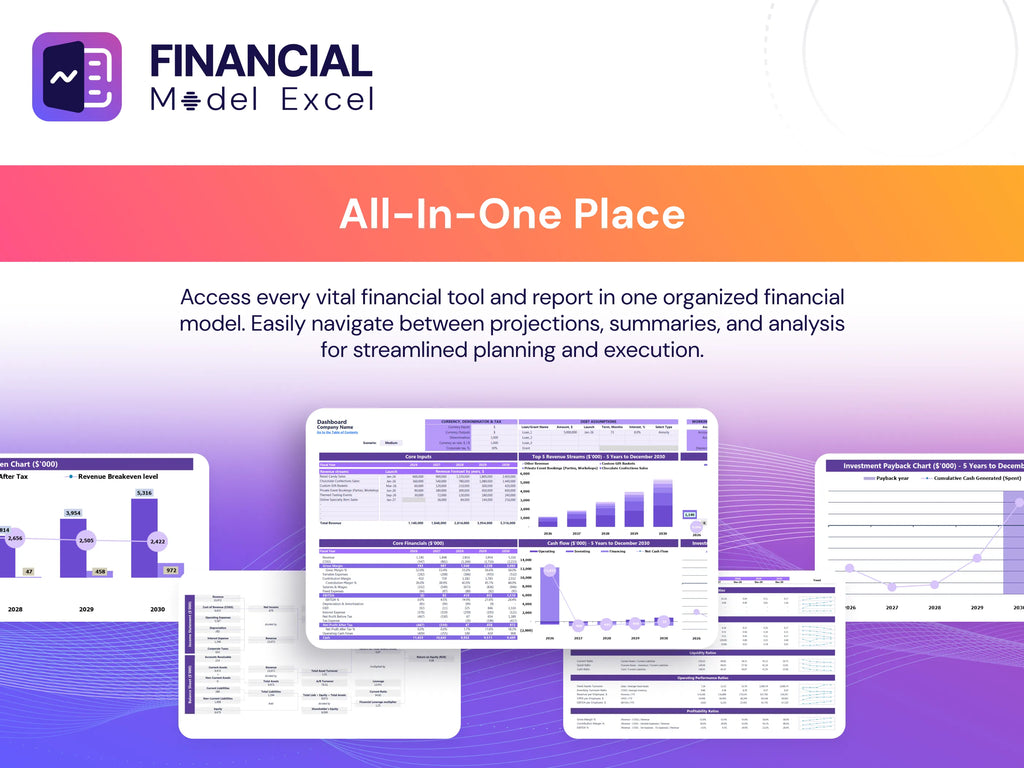
Dashboard
The pro forma template is an essential tool for financial planning, offering in-depth cash flow projections and a 5-year projected balance sheet in Excel. It enables detailed financial modeling for RPA implementation, supporting cost-benefit analysis and robotic automation expense modeling. Users can generate breakdowns by month or year, providing clear insights into RPA investment financial forecasts and ROI models. The dynamic dashboard displays data numerically and visually, empowering informed decision-making for robotic process automation budgeting and strategic financial scenarios tailored to RPA deployment.
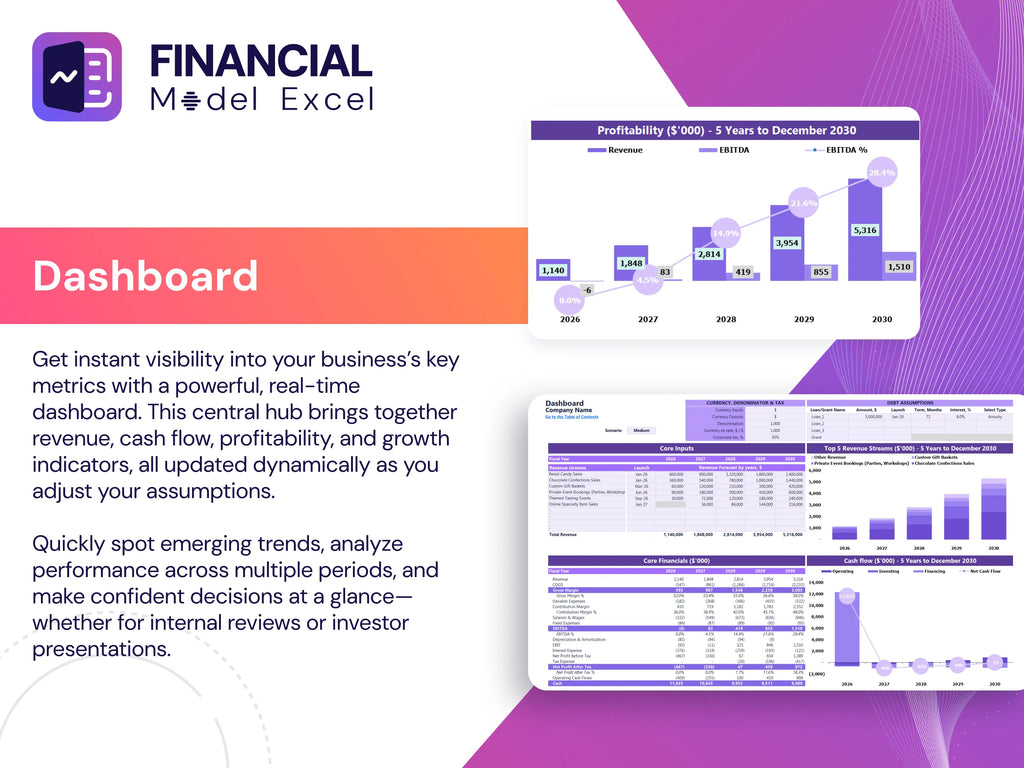
Business Financial Statements
Our financial model template features a comprehensive summary drawing from detailed spreadsheets, including projected balance sheets, pro forma income statements, and cash flow analyses tailored for RPA implementation. Designed by experts, this summary streamlines your robotic process automation budgeting and financial planning — ideal for your pitch deck. Whether conducting cost-benefit analysis of RPA or forecasting revenue models for RPA providers, this tool delivers clarity on financial impact, ROI, and profit margins. Empower your RPA business case financials with precise projections and insightful KPIs to confidently showcase your investment’s value.
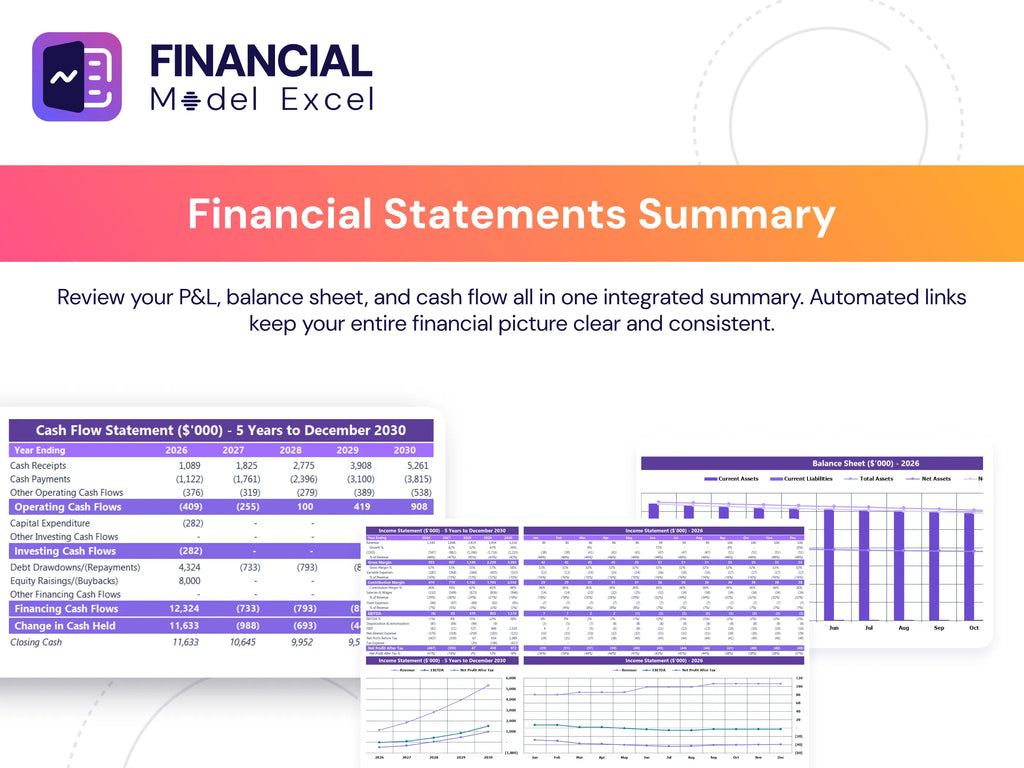
Sources And Uses Statement
This financial model for RPA implementation features a detailed sources and uses statement, offering a clear summary of funding origins and allocations. Designed for robotic process automation budgeting and cost-benefit analysis, it enables precise financial planning for RPA projects. By integrating key RPA financial metrics and KPIs, users can evaluate the financial impact of robotic automation, optimize their revenue model, and enhance RPA provider profit margins. This tool supports robust financial projections for RPA services, empowering stakeholders to craft a compelling RPA business case financials and maximize ROI through strategic robotic automation expense modeling.
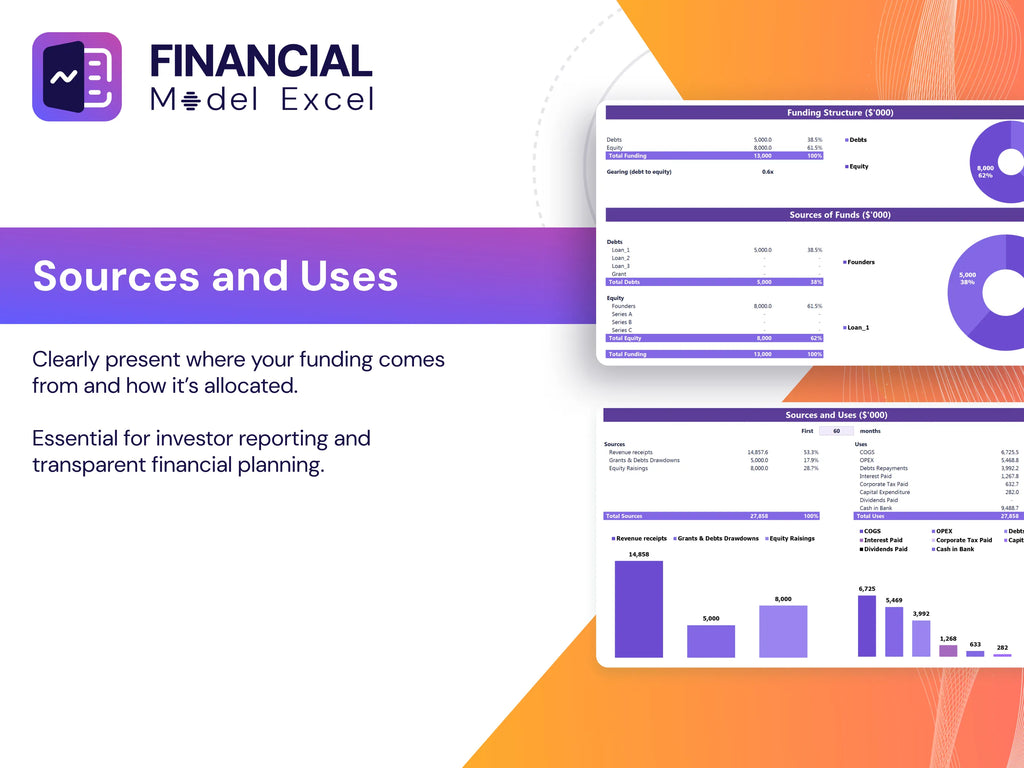
Break Even Point In Sales Dollars
Our 5-year financial projection includes a detailed break-even analysis, a critical component in robotic process automation budgeting and pricing strategy. This analysis helps RPA providers determine the optimal price point where revenue covers all costs, ensuring sustainable profit margins. By integrating robotic automation cost analysis and financial modeling for RPA implementation, companies can develop robust financial scenarios for RPA deployment. This approach enhances financial planning for RPA projects, supporting informed decisions that maximize the financial impact of robotic automation and drive strong ROI models for RPA services.
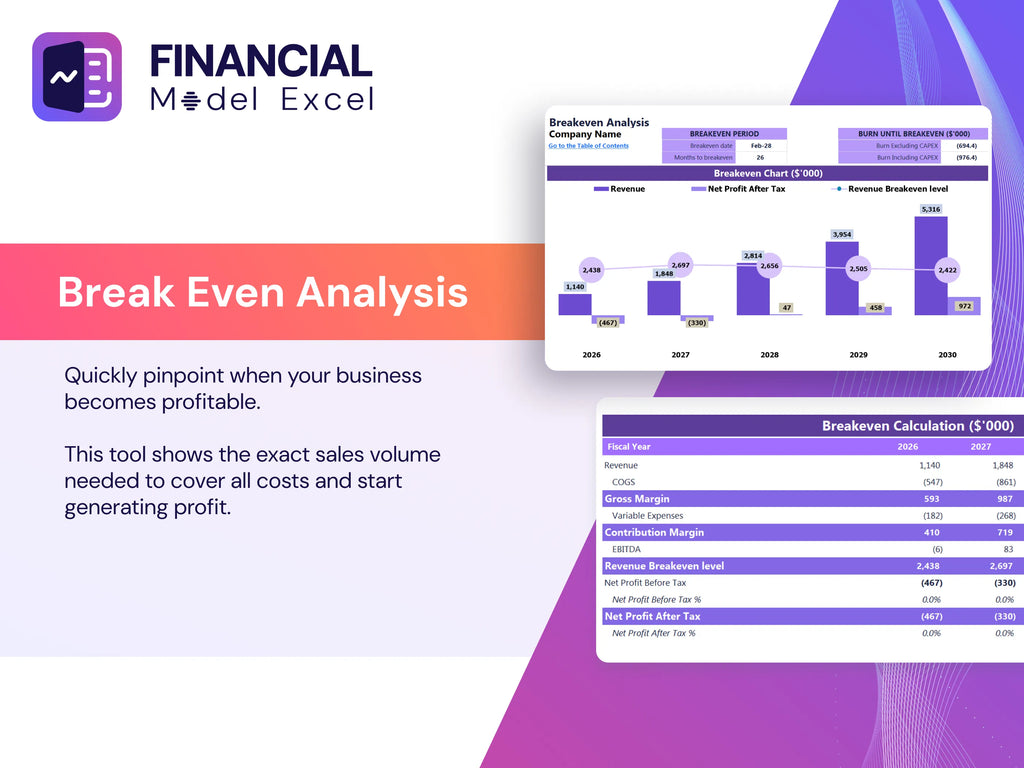
Top Revenue
The Top Revenue tab in the pro forma financial statements template offers a clear, detailed breakdown of your company’s revenue by product line. This robust financial model for RPA implementation delivers annual revenue projections across multiple streams, supported by comprehensive revenue bridges. Ideal for RPA providers, it enhances financial planning for RPA projects by enabling precise revenue forecasting, aiding in cost-benefit analysis of robotic process automation, and strengthening your RPA business case financials. Use this tool to optimize robotic automation pricing strategy and elevate your RPA investment financial forecast with accurate, actionable insights.
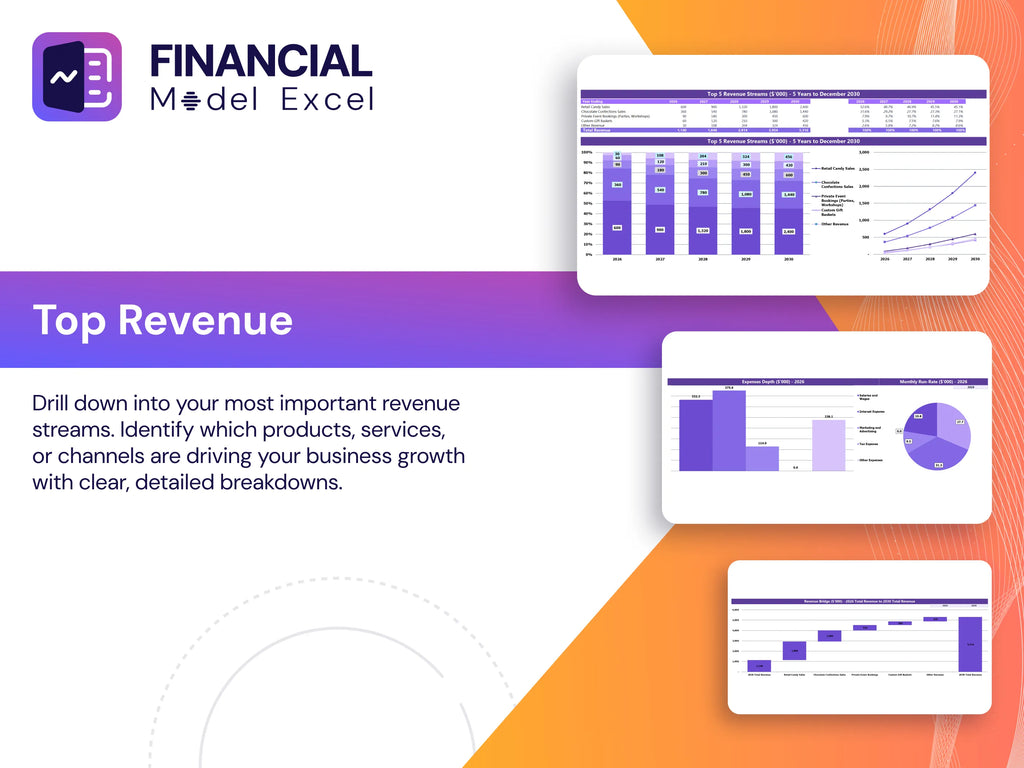
Business Top Expenses Spreadsheet
In robotic process automation (RPA) financial modeling, the top line represents total revenue generated from RPA services or vendor revenue streams, indicating growth in market demand. Bottom line reflects net income after deducting robotic automation costs and expenses, highlighting profitability and RPA provider profit margins. Understanding these financial metrics and KPIs within an RPA investment financial forecast or cost-benefit analysis is crucial for building a strong business case. Accurate financial projections for RPA implementation and robotic automation budgeting ensure strategic decision-making, maximizing ROI and optimizing the financial impact of robotic automation projects.
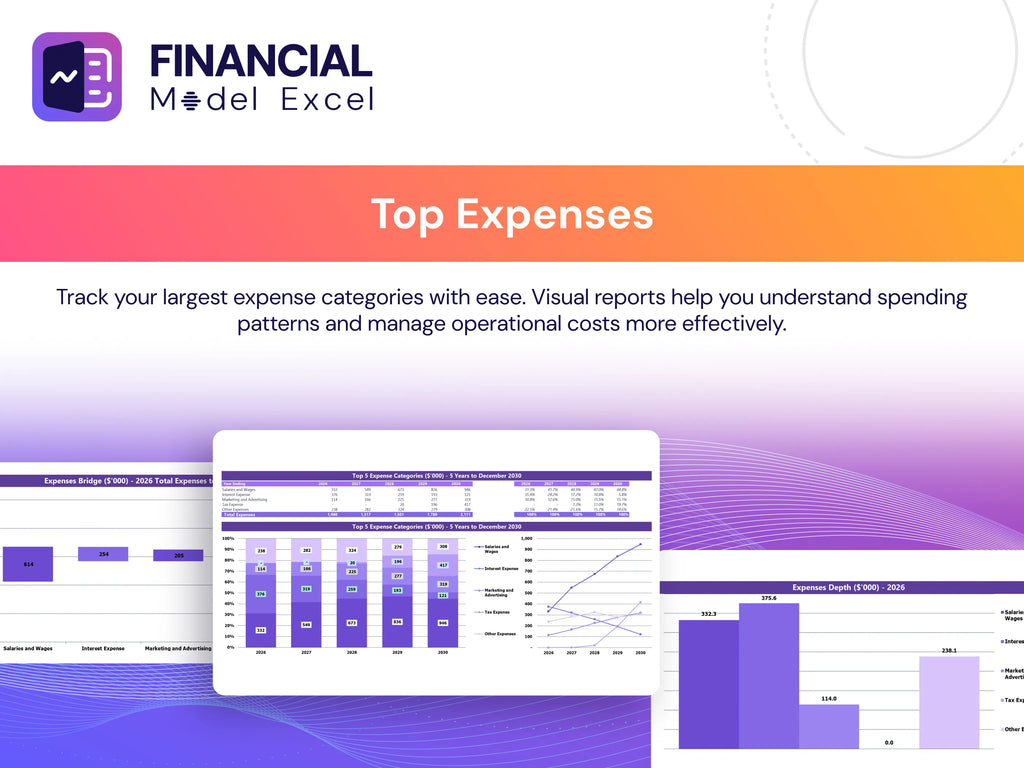
ROBOTIC PROCESS AUTOMATION RPA PROVIDER FINANCIAL MODEL FINANCIAL PROJECTION EXPENSES
Costs
A robust financial model for RPA implementation is essential for accurately projecting costs, forecasting risks, and analyzing key financial metrics and KPIs. This tool highlights critical areas needing strategic focus to mitigate potential losses and enhance performance. Moreover, a comprehensive robotic process automation budgeting and cost-benefit analysis play a pivotal role in crafting a compelling RPA business case financials. Clear financial projections for RPA services not only support informed decision-making but also strengthen funding appeals by demonstrating the financial impact of robotic automation and the ROI model to prospective investors.
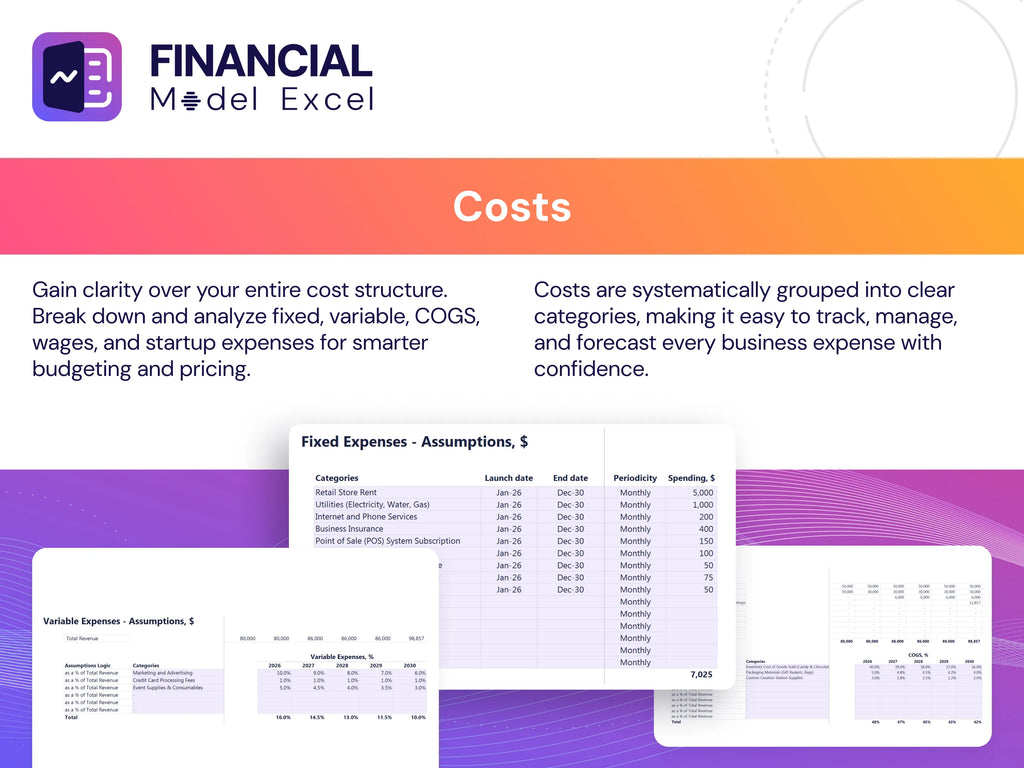
CAPEX Spending
Financial experts develop comprehensive financial models for RPA implementation, accurately forecasting startup costs while monitoring investments in fixed assets. These models incorporate depreciation, asset additions, and disposals related to property, plant, and equipment (PPE), including leased assets. This detailed robotic process automation budgeting ensures precise CAPEX forecasting, enabling informed financial planning for RPA projects and robust cost-benefit analysis of robotic automation investments.
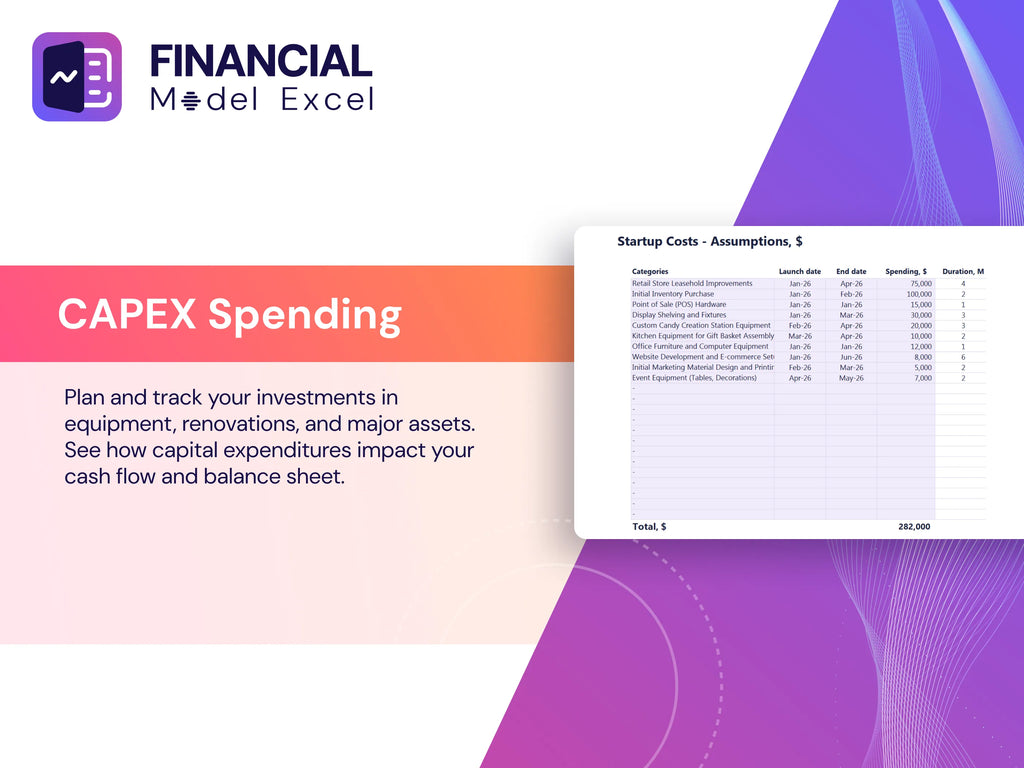
Loan Financing Calculator
A comprehensive financial model for RPA implementation includes a detailed robotic automation cost analysis and loan amortization schedule. This schedule outlines periodic payments, principal reduction, and interest over the loan term, enabling precise robotic process automation budgeting. By integrating this with RPA financial projections and cost-benefit analysis, organizations can optimize their RPA investment financial forecast. Accurate amortization insights support the development of a robust RPA business case financials, enhancing financial planning for RPA projects and ensuring a clear view of the robotic process automation ROI model and overall financial impact of robotic automation.
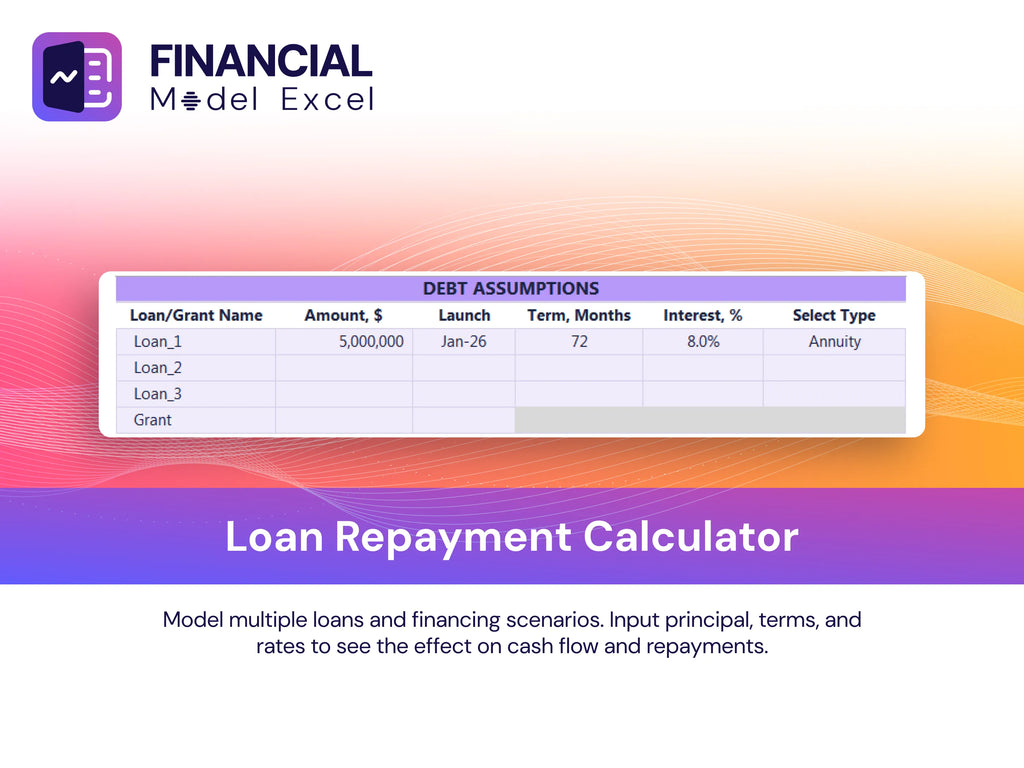
ROBOTIC PROCESS AUTOMATION RPA PROVIDER FINANCIAL MODEL EXCEL FINANCIAL MODEL METRICS
Financial KPIs
EBITDA, a key financial metric, reveals a company’s core profitability by excluding interest, taxes, depreciation, and amortization. Unlike cash flow, it captures both monetary and non-monetary elements, offering a clearer picture of operational performance. In robotic process automation (RPA) projects, incorporating EBITDA into financial modeling and cost-benefit analysis enhances the accuracy of RPA investment financial forecasts. This metric is invaluable for developing robust financial projections, optimizing robotic automation budgeting, and assessing RPA provider profit margins, ultimately driving informed decisions with strong ROI and sustainable revenue models in the dynamic RPA landscape.
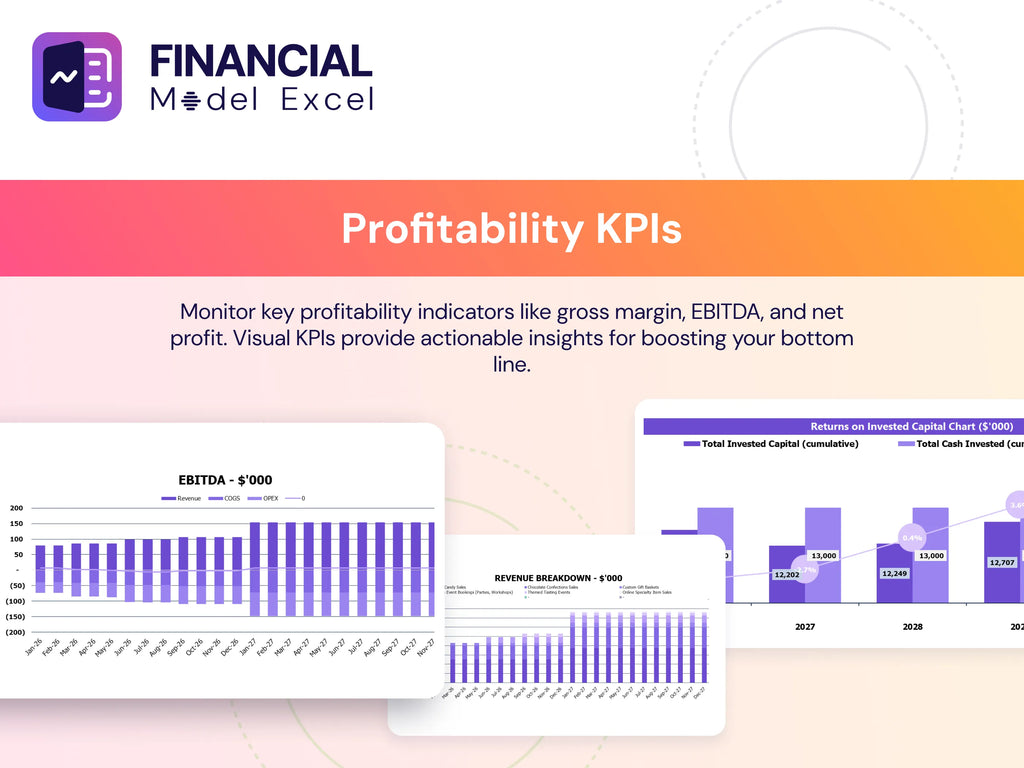
Cash Flow Forecast Excel
A robust cash flow forecast is essential for precise financial planning in robotic process automation (RPA) projects. Unlike profit and loss statements, it focuses on cash inflows and outflows, offering a clearer view of liquidity. Integrated within comprehensive financial models for RPA implementation, this forecast supports effective robotic automation cost analysis and budgeting. Utilizing advanced cash flow forecasting tools, companies can project financial scenarios for RPA deployment up to five years, enabling accurate financial impact assessments, ROI modeling, and strategic pricing decisions—empowering RPA providers to optimize revenue models and enhance profit margins.
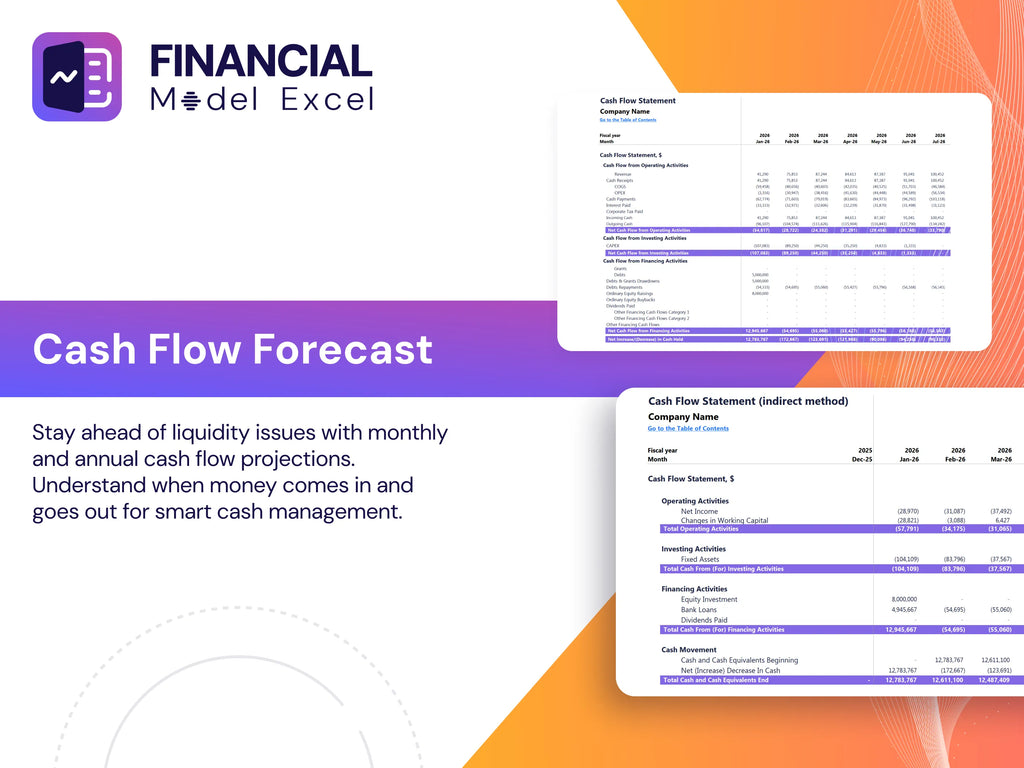
KPI Benchmarks
The startup benchmark tab delivers a comprehensive financial model for RPA implementation by analyzing key performance metrics against industry averages. Leveraging financial benchmarks enables robotic process automation providers to conduct accurate cost-benefit analysis and refine their pricing strategy. This approach supports robust financial planning for RPA projects, enhancing the financial impact of robotic automation and optimizing profit margins. By comparing to sector best practices, businesses gain valuable insights for RPA investment financial forecasts, driving strategic decisions with precise financial projections and KPIs to maximize robotic automation ROI and streamline budgeting efforts.
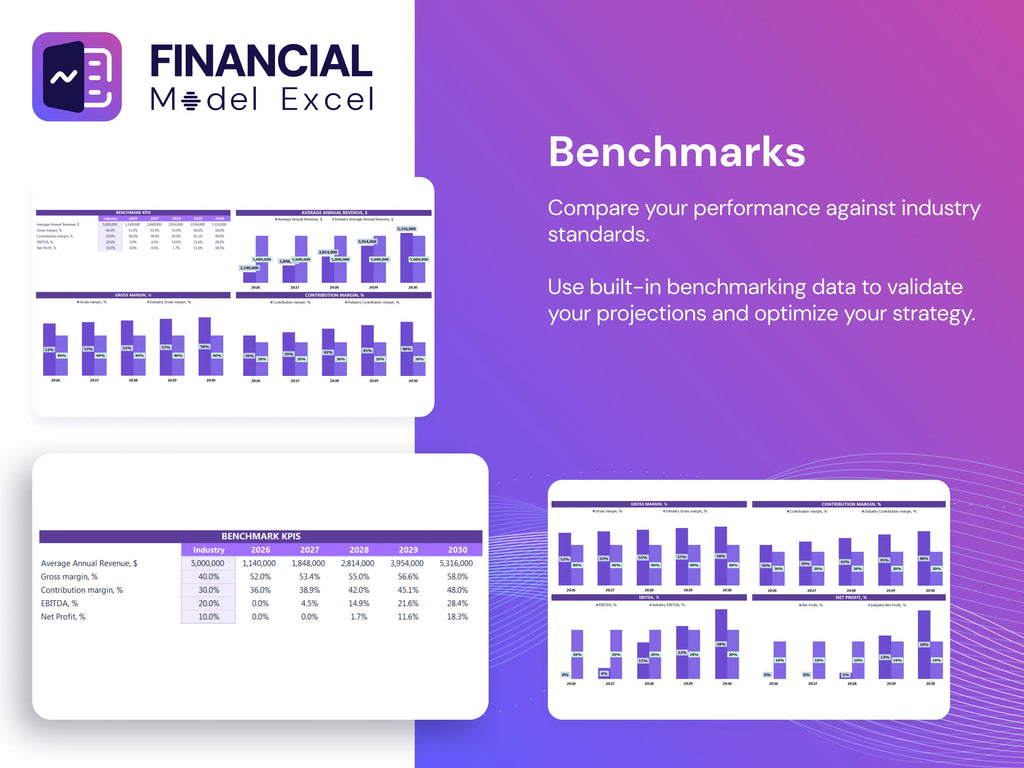
P&L Statement Excel
To safeguard and grow your robotic process automation (RPA) provider’s profitability, leveraging a comprehensive financial model is essential. Utilizing a P&L Excel template with robust RPA investment financial forecasts enables accurate projection of revenues, expenses, and profit margins. This approach offers clear financial scenarios for RPA deployment and valuable insights through annual reports, guiding strategic decisions. Especially beneficial for startups and expanding RPA vendors, this financial planning tool sharpens focus on optimizing the robotic automation cost analysis and maximizing ROI, ensuring sustainable growth and competitive advantage in the evolving RPA market.
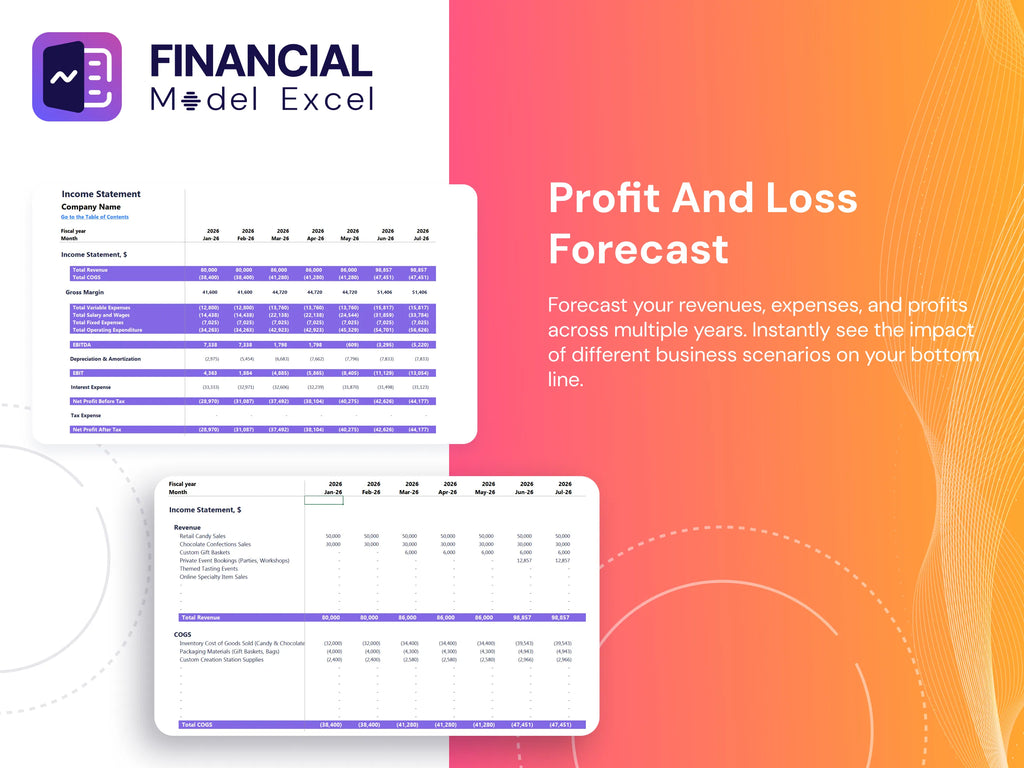
Pro Forma Balance Sheet Template Excel
In developing a robust RPA provider revenue model, integrating a 5-year forecasted balance sheet, income statement, and cash flow proforma is essential. This comprehensive financial planning for RPA projects enables accurate robotic automation cost analysis and supports precise cash flow forecasting. While income statements capture investor attention, the balance sheet provides critical insight into cash utilization and financial stability. Combined with key financial metrics and KPIs, this approach strengthens the RPA business case financials, enhances financial impact analysis of robotic automation, and drives informed decisions on RPA investment financial forecasts and ROI models.
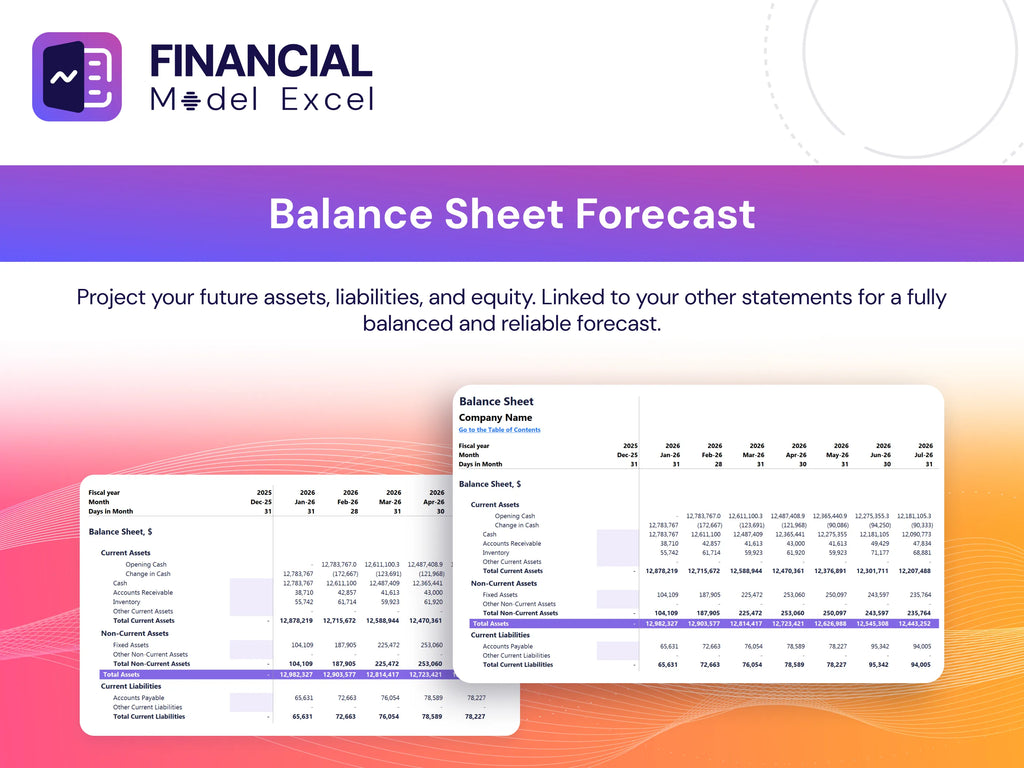
ROBOTIC PROCESS AUTOMATION RPA PROVIDER FINANCIAL MODEL FINANCIAL PROJECTION TEMPLATE VALUATION
Startup Valuation Model
Our financial model for RPA implementation features a comprehensive valuation tab that enables Discounted Cash Flow (DCF) analysis with ease. By inputting key rates such as Cost of Capital, users can quickly generate accurate financial projections for RPA services. This streamlined approach supports robotic process automation budgeting and cost-benefit analysis, empowering businesses with robust financial planning for RPA projects and clear insights into the financial impact of robotic automation.
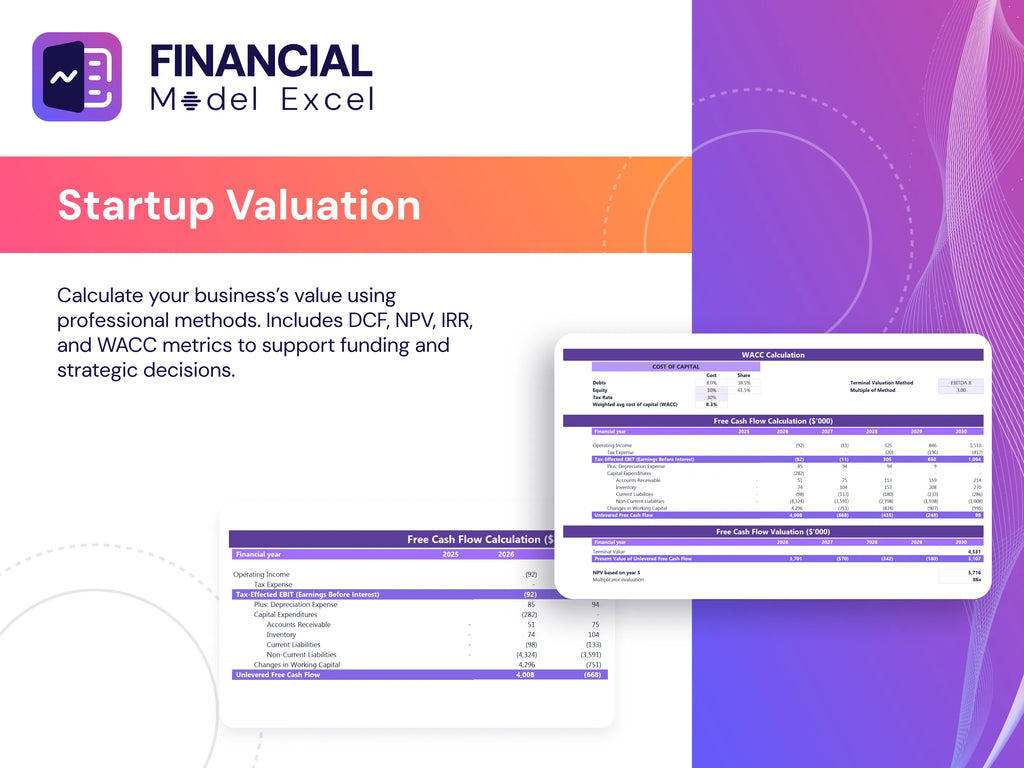
Cap Table
Our financial model for RPA implementation seamlessly integrates the startup’s cap table with cash flow projections, linking funding rounds to instruments like equity and convertible notes. This approach provides a comprehensive robotic automation cost analysis and clearly illustrates the financial impact of ownership changes and dilution. By incorporating these elements, the model supports robust financial planning for RPA projects, enhancing the RPA business case financials and enabling accurate financial projections for RPA services. This ensures strategic clarity in assessing RPA investment financial forecasts and optimizing revenue models for RPA providers.
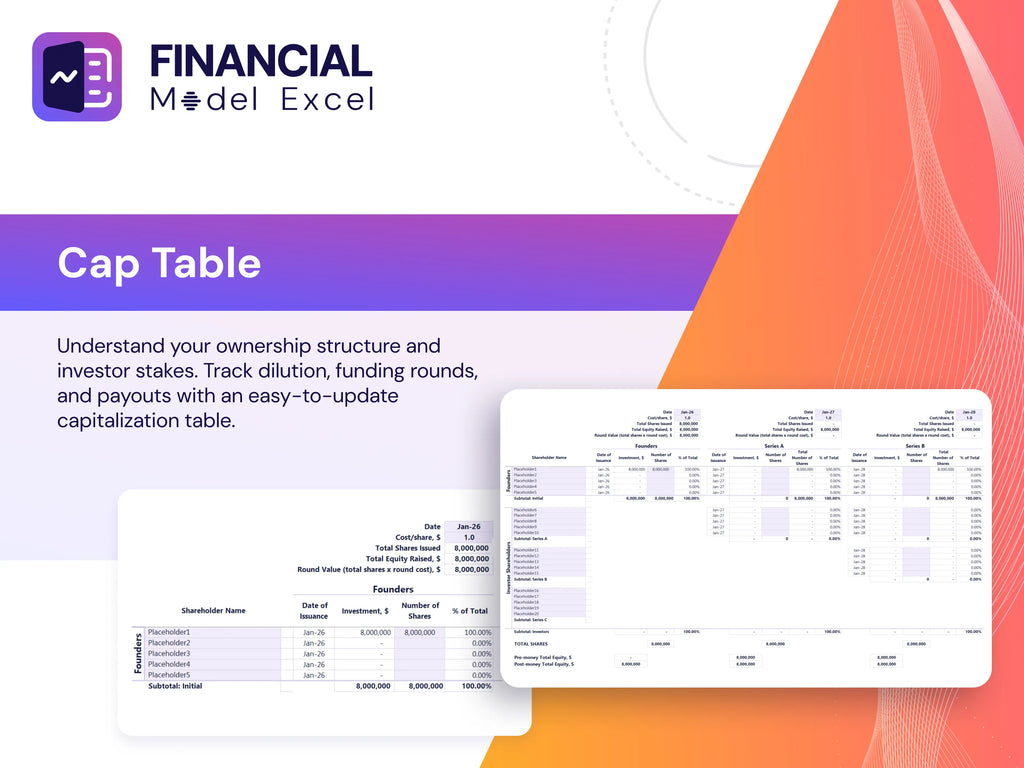
ROBOTIC PROCESS AUTOMATION RPA PROVIDER THREE STATEMENT FINANCIAL MODEL ADVANTAGES
The financial model accurately predicts cash flow, optimizing robotic process automation budgeting and maximizing ROI for RPA projects.
Optimize investment decisions with a robust robotic process automation financial model for accurate RPA provider forecasting.
Accurate robotic process automation financial models enable precise expense forecasting, optimizing RPA provider profitability and growth.
The financial model reveals clear break-even timing and maximizes ROI for strategic robotic process automation implementation.
Accurate financial models optimize RPA provider revenues and expenses, driving strategic growth and maximizing profit margins.
ROBOTIC PROCESS AUTOMATION RPA PROVIDER FINANCIAL PROJECTION MODEL ADVANTAGES
Our financial model for RPA implementation saves you time while maximizing accuracy and forecasting profitability effectively.
The financial model for RPA implementation streamlines budgeting, maximizing ROI while accelerating business growth and innovation.
A robust financial model for RPA implementation optimizes accounts receivable, enhancing cash flow and operational efficiency.
A robust financial model for RPA reveals precise cash flow impacts, highlighting late payments to optimize revenue management.
The financial model for RPA implementation simplifies budgeting and maximizes ROI with clear, practical cost-benefit analysis.
Unlock precise RPA financial planning and forecasting effortlessly, boosting confidence in your robotic process automation investments.
Robotic process automation financial modeling empowers precise budgeting and maximizes ROI for sustainable business growth.
A robust financial model for RPA implementation reveals optimal growth strategies and funding impacts, enhancing your business’s cash flow.
Optimize funding success with a robust financial model showcasing RPA’s cost savings and revenue growth potential.
Impress investors confidently with a robust RPA provider financial model driving precise revenue forecasts and superior ROI insights.





